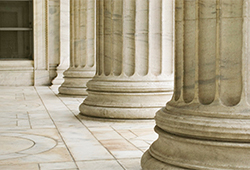 Yesterday, in Ericsson Inc. v. Regents of the University of Minnesota, an expanded 7-judge PTAB panel ruled that a patent owner waives a claim to sovereign immunity in an IPR “by filing an action in federal court alleging infringement of the patent being challenged in [the IPR] proceeding.”
Yesterday, in Ericsson Inc. v. Regents of the University of Minnesota, an expanded 7-judge PTAB panel ruled that a patent owner waives a claim to sovereign immunity in an IPR “by filing an action in federal court alleging infringement of the patent being challenged in [the IPR] proceeding.”
The PTAB first acknowledged that 11th Amendment immunity was available to state entities in IPRs, such as the Regents of the University of Minnesota, the patent owner in this case: “IPR is an adjudicatory proceeding of a federal agency from which state entities are immune.” However, the PTAB noted that here, the patent owner had sued for infringement of the same patent in federal district court. While a state’s waiver of 11th Amendment immunity in one action does not necessarily extend to a separate action, the PTAB found this situation similar to the situation in Regents of Univ. of New Mexico v. Knight (Fed. Cir. 2003), in which a state was found to have waived its 11th Amendment immunity as to compulsory counterclaims because “a state as plaintiff can surely anticipate that a defendant will have to file any compulsory counterclaims or be forever barred from doing so.” Similarly, a patent infringement defendant must request an IPR of the asserted patent “within one year of service of that complaint or be forever barred from doing so.” Thus, the PTAB reasoned that “it is reasonable to view a State that files a patent infringement action as having consented to an inter partes review of the asserted patent.”
Moreover, since it is the state’s litigation conduct that triggers the one-year bar for IPR, the PTAB stated that it would “be unfair and inconsistent to allow a State to avail itself of the federal government’s authority by filing a patent infringement action in federal court, but then selectively invoke its sovereign immunity” to bar a defendant form requesting an IPR from a different branch of federal government.
Judge Bisk wrote separately to concur and add her opinion that “a state university, having availed itself of Patent Office procedures to secure patent rights from the public, may not subsequently invoke sovereign immunity as a shield against reconsideration by the Patent Office in an inter partes review proceeding of whether the agency improvidently granted a patent monopoly in the first instance.”
Separately, as we previously reported, Allergan, Inc. assigned its rights to patents covering its Restasis® dry eye treatment to the St. Regis Mohawk Tribe (“Tribe”) and simultaneously licensed back those patents in exchange for the Tribe’s agreement to invoke tribal sovereign immunity in IPR proceedings before the PTAB. The Tribe’s motions to terminate the IPRs remain pending.

